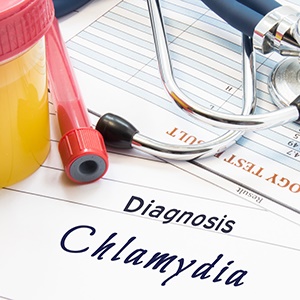
The symptoms aren’t always obvious. Over one million sexually transmitted infections are spread, transmitted and acquired worldwide every single day, says the World Health Organization (WHO).
That’s a lot of STIs like chlamydia, gonorrhoea, syphilis and Trichomoniasis doing the rounds.
Chlamydia is the most common STI on the global scale. Yet we’re still mostly in the dark about it here in South Africa, says Cape Town gynaecologist, Dr Natalia Novikova.
Chlamydia is particularly dangerous because of its silent nature. Almost 70% of those infected (people in their mid-20s are most at risk) don’t see or experience any glaringly obvious symptoms of infection, says Dr Novikova.
Mild symptoms that do show up are often mistaken for another condition; so most people tend to live with chlamydia without getting it treated. And left undiagnosed, it’s freely and easily passed on from partner to partner without any party the wiser.
How chlamydia is contracted
You can contract it by having unprotected vaginal, anal or oral sex with anyone who has it. The infection can be passed from person to person via sexual fluids, but this can even happen in the absence of penetration, orgasm or ejaculation. It can be passed on at any point when people’s genitals touch, or in the case of sharing sex toys.
The bacteria, known as Chlamydia trachomatis, acts by infecting the urethra in men and the urethra and cervix in women. Thirty percent of cases spread within the pelvic organs, but it can also contaminate areas of the body like the throat.
By causing inflammation of the cervix or urethra, the bacteria causes cervicitis or urethritis, as well as a condition called lymphogranuloma venereum (LGV). This issue could bring about serious genital ulcers and even enlarged lymph nodes in the groin region.
Symptoms
Although symptoms aren’t apparent for most, some mild signs of infection can start showing up a few weeks after infection, including the following:
- Inflammation of the cervix in women and urethra in men.
- It burns when you urinate, and/or you experience urinary urgency (a constant feeling of desperately needing to urinate).
- Pain experienced during sex and in the lower stomach (especially for women).
- A milky/cloudy vaginal/penis discharge.
- Irregular or heavier periods than usual.
- Swollen and sensitive testicles.
- Fever and cramping.
- General fatigue.
- Bleeding around the anus.
Diagnosing chlamydia
The most sensitive test for chlamydia is PCR in urine or vaginal/cervical secretion swab. This usually means providing a sample of urine or a swab from the cervix, vagina or urethra.
Where to go:
- Visit your general practitioner, gynaecologist or urologist.
- Get yourself checked out at local clinics or centres like Marie Stopes or Better2Know.
Treatment
Leaving it untreated can cause irreversible damage to the Fallopian tubes in women, which can lead to infertility. For mothers-to-be, this STI can bring about an ectopic pregnancy or preterm labour - and cause the baby to have a low birth weight. If a mother is infected, she can also pass it on to her newborn. In some cases, it can also cause eye infections.
Because it’s a bacterial infection, it can easily be treated with antibiotics. The problem is that people don’t know they’re infected, which allows the STI to keep spreading. It’s estimated that as many as 95 out of 100 people with chlamydia will be cured if they take their antibiotics correctly.
There are two routes: the single dose and the longer course (two capsules a day for a week). Commonly prescribed antibiotics to treat chlamydia are azithromycin (single dose) and doxycycline (a longer course). Pregnant women or those with specific allergies might be prescribed a different medication.
Being treated for chlamydia once doesn’t make you immune to contracting it again in the future.
Avoid infection
- Routine STI scans are important when having unprotected sex.
- Use condoms with a new partner for the first three months, then have an STI test before you stop using condoms (in a monogamous relationship).
- Use a dam (a thin sheet of soft plastic or latex) to cover the female genitals during oral sex.
- Don’t share sex toys.
- Abstain from vaginal, anal and oral sex completely.




 Publications
Publications
 Partners
Partners










